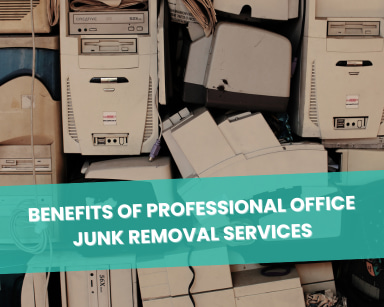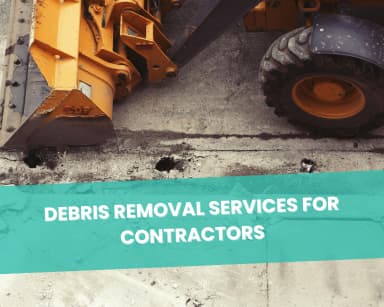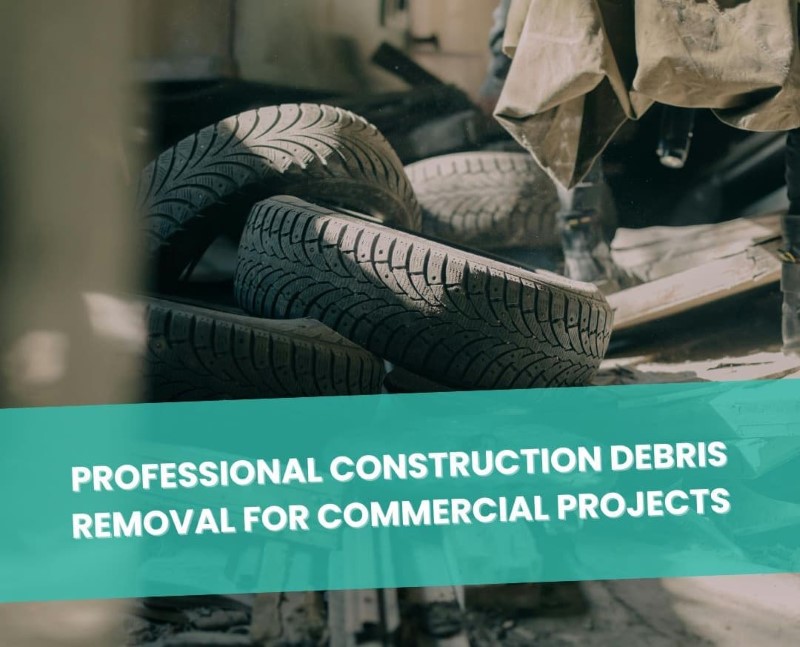Debris Removal Services for Contractors | What to Expect
In construction, timing, coordination, and cleanliness is very important. Efficient debris removal boosts efficiency and keeps the site safe. They make operations smoother and prevent delays. Understanding commercial-grade debris removal services helps contractors choose the right partner and keeps projects on schedule.
Table of Contents
Why Contractors Need a Debris Removal Company
Commercial sites quickly accumulate waste like metal, insulation, and broken concrete without a proper cleanup plan. A professional debris removal company quickly clears these materials. This lets workers concentrate on their tasks without interruptions.
Contractors need services that accommodate their needs during multi-phase building projects. A debris removal service offers flexible timing, trained staff, and proper equipment for handling large amounts of waste. This helps the building process run smoothly and avoids delays from cleanup.
What Construction Debris Removal Includes
Construction debris removal usually means picking up and transporting various safe building materials. These include:
- Scrap lumber
- Sheetrock and drywall remnants
- Pallets
- Concrete rubble
- Metal fragments
- Roofing materials
- Flooring debris
- Job site packaging
Commercial contractors require debris removal designed for large, complex sites. This includes logistical support, safety standards, and scheduled disposal. They also need more than just pickup trucks and dumpsters.
The Value of Commercial Debris Removal Services
Working with a debris removal company that focuses on large projects offers several benefits:
1. Improved Job Site Efficiency
Timelines for construction are tight. Debris can slow development, limit space, and create safety issues. On-demand services and scheduled pickups help keep the site organised and clean.
2. Reduced Labor Demands
Professional debris removal services help contractors keep their teams focused by handling disposal tasks. This shifts labour to where it is most needed on actual construction projects.
3. Customized Pickup Options
Every location is unique. Some need daily cleanouts, while others require bulk removal periodically. A dependable debris removal service can schedule pickups based on contractor preference, project phase, or volume.
4. Transparent Regional Pricing
Big construction companies often work in multiple states or cities. Regional pricing systems help maintain project uniformity and manage budgets. Clear cost assumptions allow contractors to plan effectively.
5. Professional Account Management
Professional debris removal companies offer more than just manual labour. They provide a single point of contact to make communication easier. This helps with project supervision and progress reports. This level of professionalism ensures accountability at every stage and makes everything clearer.
Construction Projects That Benefit from Debris Removal Services
Most commercial contractors benefit from organised waste disposal. However, certain types of building projects rely heavily on these services:
- Office moveouts and renovations
- Retail construction and decommissioning
- Warehouse expansions and upgrades
- Industrial developments
- Large-scale commercial tenant improvements
In these environments, construction debris removal is a must, as these services keep work flowing smoothly. They are useful for complex construction projects and multi-site rollouts.
Logistics and Coordination Matter
Removing debris isn’t just about clearing waste. In busy work environments, it requires careful teamwork. Professional debris removal companies offer:
- Site assessments before pickups
- Scheduled or recurring cleanouts based on job timelines
- Proper equipment to handle large, heavy, or awkward materials
- Centralized support for questions, scheduling changes, or scope adjustments
Seamless logistics cut down job site disturbance. Smooth collaboration is key for contractors managing budgets, timelines, and subcontractors.
Reporting and Documentation
Documentation is key for building a business. Many debris removal companies provide sustainability or disposal reports on request. These reports help project managers track site performance, service frequency, and volume. They also support internal reporting and compliance paperwork when needed.
Not all projects need it, but detailed removal data can help improve corporate construction goals.
Conclusion: Set Expectations, Build Efficiently
Any contractor wanting to keep projects safe, efficient, and on time must handle debris removal. By working with a qualified waste removal firm, contractors can enjoy simpler logistics, steady pricing, and tailored support from start to finish.
Debris removal services are essential for construction sites. They go beyond convenience; they are crucial for effective job site management. This includes daily cleanups and bulk concrete removal. Contractors who prioritise reliable removal partners can achieve better results on time and within budget.










